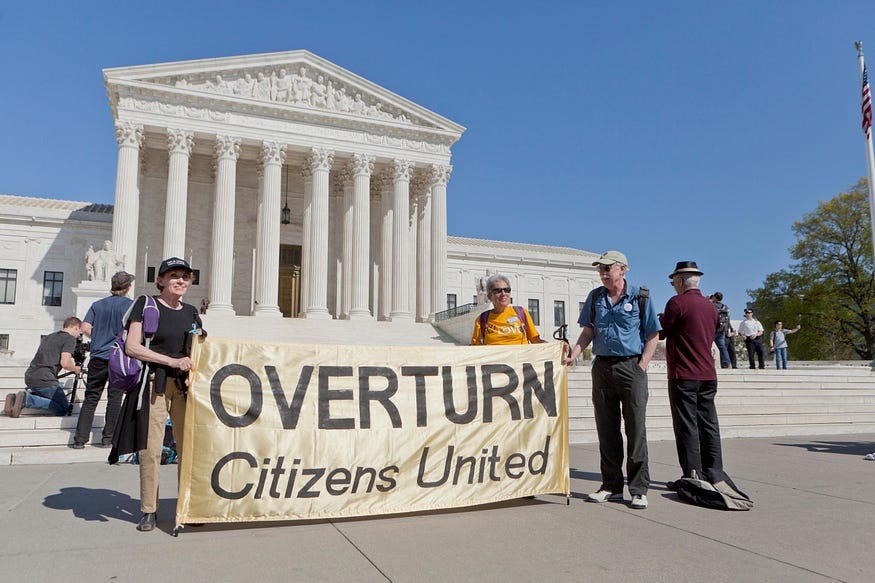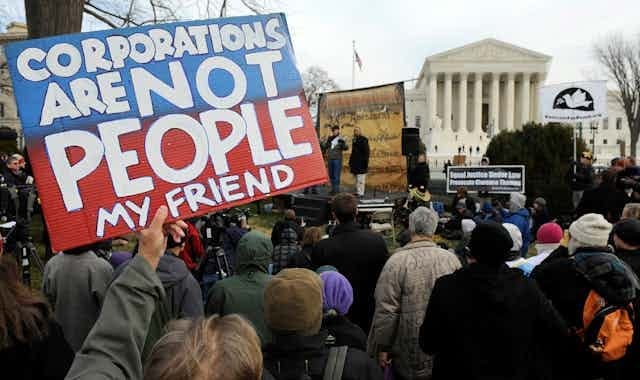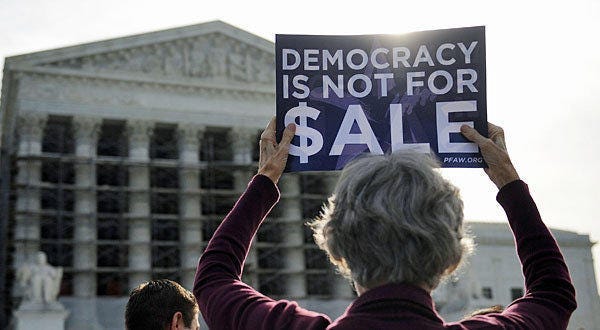How Big Money Took Control of the American Narrative
From Citizens’ Voices to Corporate Dollars: The Impact of the 2010 Citizens United Decision on U.S. Politics
Introduction
Before 2010, political power in the United States was more evenly distributed among its citizens. Campaign finance laws, albeit imperfect, placed limits on how much corporations, unions, and wealthy individuals could spend to influence elections. The Supreme Court’s decision in Citizens United v. Federal Election Commission fundamentally shifted this balance, granting corporations and unions the right to spend unlimited amounts of money on political campaigns. This ruling effectively transformed the American political landscape, placing unprecedented power in the hands of a small elite and significantly diminishing the voice of the average voter.
The Landscape Before Citizens United
Prior to the Citizens United ruling, political donations were subject to various restrictions designed to prevent excessive influence by a wealthy minority. Limits on corporate and union contributions were set by the Federal Election Campaign Act of 1971 and reinforced by the Bipartisan Campaign Reform Act of 2002, also known as the McCain-Feingold Act. These regulations aimed to curb the potential for corruption and maintain a degree of equality in political influence among voters.
The court argued that political spending is a form of protected speech, and therefore, the government could not restrict it, even when it came from corporations and unions.
The Citizens United Decision: A Game Changer
The Citizens United ruling declared that corporate funding of independent political broadcasts in candidate elections cannot be limited under the First Amendment, which guarantees free speech. The court argued that political spending is a form of protected speech, and therefore, the government could not restrict it, even when it came from corporations and unions. This landmark decision allowed for the creation of Super Political Action Committees (Super PACs), entities that can raise unlimited sums of money from corporations, unions, and individuals to spend independently on political campaigns.
The Rise of Big Money in Politics
Following the decision, the influence of wealthy donors and corporations surged. Politicians began to prioritize the interests of those who could finance expensive campaigns over the needs of their average constituents. This shift in focus created an environment where legislation was often shaped by the interests of the wealthy elite rather than the broader public.
For instance, in the years following the decision, campaign spending reached new heights. According to the Center for Responsive Politics, the 2020 election cycle saw more than $14 billion in spending — double the amount spent in the 2016 election. Super PACs and dark money organizations, which can hide their donors’ identities, became central players in the political process, funding attack ads, political messaging, and even grassroots efforts to sway public opinion.
The Diminished Voice of the People
As a result of the Citizens United ruling, the average American citizen’s influence in elections has diminished. Politicians, reliant on massive financial contributions to remain competitive, are more likely to cater to the interests of their largest donors rather than the needs of their constituents. This has led to a perception, and often a reality, that policy decisions are made in favor of those who can afford to pay for access and influence.
Issues like healthcare, tax policy, and environmental regulation have been shaped by well-funded interest groups that have the resources to lobby effectively and support candidates aligned with their interests. The result is a legislative process that often overlooks the concerns of the general public, exacerbating economic inequality and fueling public discontent with the political system.
The Impact on Democracy
The increasing dominance of big money in politics poses a significant threat to democratic governance in the United States. Democracy thrives when all citizens have an equal opportunity to participate in the political process and when elected officials are accountable to their voters. However, the influx of corporate money and the rise of Super PACs have created a system where political power is increasingly concentrated in the hands of a few.
Moreover, the lack of transparency around campaign financing — facilitated by dark money groups that do not have to disclose their donors — undermines public trust in the political process. Many Americans feel that their votes no longer matter, leading to lower voter turnout and greater political polarization.
Potential Reforms and Solutions
To counteract the effects of the Citizens United decision, several reform proposals have been suggested:
Public Financing of Campaigns: By providing public funding for political campaigns, candidates could rely less on large donors and focus more on grassroots support.
Disclosure Requirements: Strengthening laws around donor disclosure would improve transparency and allow voters to see who is funding political campaigns and initiatives.
Amend the Constitution: Some advocates call for a constitutional amendment to overturn Citizens United, clarifying that money is not speech and corporations do not have the same rights as individuals in political spending.
Conclusion
The Citizens United ruling marked a turning point in American democracy, tipping the scales in favor of the wealthy elite and reducing the power of ordinary citizens to influence the political process. As money increasingly dominates the electoral landscape, the United States faces a critical juncture: to continue down a path where big money dictates political outcomes or to enact reforms that restore democratic integrity and ensure that every voice, not just those with the deepest pockets, is heard.
By recognizing the impact of Citizens United and advocating for meaningful reforms, citizens can begin to reclaim their role in shaping the future of their country. The question remains: will America choose to be a democracy of the people, by the people, and for the people, or one controlled by the highest bidder?
References:
“Citizens United v. FEC,” Oyez, www.oyez.org.
Center for Responsive Politics, www.opensecrets.org.
“Campaign Finance Reform: A Necessary Step for American Democracy,” Brennan Center for Justice, www.brennancenter.org.





